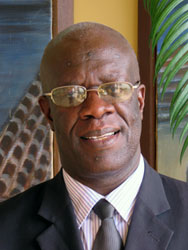Q and A with Dr Nelson Sewankambo on research and training in Uganda
July / August 2015 | Volume 14, Issue 4

Dr. Nelson Sewankambo
Dr. Nelson Sewankambo is Principal of Uganda's Makerere University College of Health Sciences and Dean Emeritus of its School of Medicine. A longtime Fogarty grantee, he has played a key role in implementing capacity building under the U.S. Medical Education Partnership Initiative (MEPI). He co-founded Uganda's Rakai Health Sciences Program, which has produced key HIV/AIDS research findings, including that male circumcision reduces HIV transmission. His team has pioneered multidisciplinary education capacity, the use of information technologies and innovations, such as problem-based learning, as well as training that incorporates rural areas.
What has Fogarty's role been in Uganda?
We started from a low base, more than 15 years ago, after our country went through a very difficult decade-and a-half of economic decline. Fogarty-supported programs contributed enormously to the recovery of the research platform. Initially, all Ugandans were trained overseas, but over time we established research training programs in Uganda all the way to Ph.D.s and postdocs - we have trained about 30 Ph.D.s now, attributable to Fogarty support overseas and at home. People trained in-country are less likely to remain overseas and it also costs less.
We see high-caliber Ugandan scientists putting in applications as independent PIs [principal investigators] and they are winning grants, not only from NIH but also European countries. Researchers here are themselves training upcoming researchers and are collaborating with global groups, like the International AIDS Vaccine Initiative. Uganda now has five high-quality research labs. Local scientists are not just collectors, sending samples elsewhere, but are interpreting and analyzing the samples. Also, we are setting up sample storage facilities to keep biospecimens for research. Finally, through Fogarty's ethics program, we built a critical mass of well-trained people and are launching a master's program in international research ethics training at Makerere.
How has the Medical Education Partnership Initiative changed the landscape?
MEPI has really excited many leaders of medical schools across Africa. The 13 recipients of grants have partnered with about 40 institutions. In Uganda, our five medical schools are all working together. Building medical capacity has enhanced research. Medical students conduct research as part of their training and some faculty are taking Ph.D. research training, which will strengthen the institutional capacity. Our MEPI linked award focuses on noncommunicable diseases (NCDs) and has contributed to strengthening research in that field.
In addition, MEPI has heightened the application of e-learning and ICT [information and communication technology]. Although ICT was introduced mainly to strengthen medical education, obviously we are benefitting on the research front. We can access resources that are otherwise unavailable. Being able to know about grant calls by different funders, we can respond and submit our applications online and we can collaborate more with people in the Northern institutions.
Is Uganda shifting from infectious diseases to NCDs?
NCDs are clearly on the rise here. We are seeing young people become increasingly overweight and you can't imagine the numbers of systemic hypertension. Also stroke, cardiovascular disease and diabetes. We are taking lessons learned from building capital for research on infectious diseases and are applying them to NCDs, for instance, the benefit of partnerships. And we are conducting cardiovascular disease training, initially through very strong partnerships with outside universities, with the intention that as we build local capacity and set up the required infrastructure, we will do much of our training locally, also with partner institutions in the region.
What are Uganda's key research priorities?
Of course, there are many infectious diseases here, like HIV, tuberculosis and malaria, and they remain priorities. We went through Ebola epidemics four times, so we need to be very alert and develop surveillance mechanisms for any emerging infectious diseases. But now NCDs are also a major national priority. If we don't start paying greater attention in that area, this country may find itself with a major epidemic of NCDs when it is too late.
We also need to increase national funding for our research priorities instead of largely depending on external funding for which we have no control. The returns are great, but the challenge is that they are slow to be realized and the politician, who would like to show results in a short timeframe, needs to be convinced. But we are working on this.
At the same time, we need to build our human resources. Multidisciplinary research is the way to go in solving our health problems, whether infectious or noncommunicable. A lot of innovations and developments in research depend on a strong basic science foundation. If we can ramp that up, it will allow us to do better translational research.
Finally, we are faced with challenges in translating our research findings and need more implementation science. At the end of the day, the research that we do should be used to deliver programs in the country and make the greatest impact in society.
More Information
To view Adobe PDF files,
download current, free accessible plug-ins from Adobe's website.